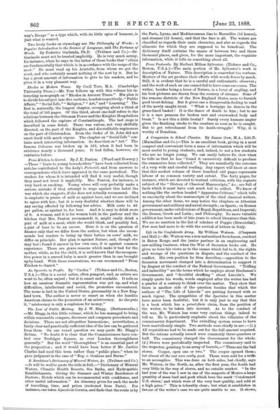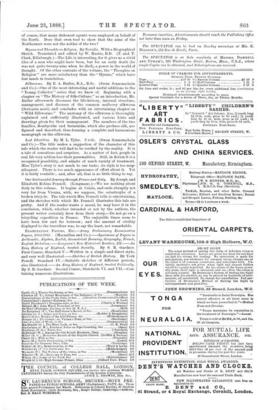Life in the Confederate Army. By William Watson. (Chapman and
Hall.)—Mr. Watson was anon-naturalised Scotchman, resident in Baton Rouge, and the junior partner in an engineering and saw-milling business, when the War of Secession broke out. He gives us here his views as to the causes which led to it, the rights and wrongs of the questions in dispute, and the conduct of the conflict. His own position he thus describes,—opposition to the Secession movement changed into a determination to support it by disgust at the conduct of the Federal Government. "Trifling and imbecility" are the terms which he employs about Buchanan's Government, and "deceitful shuffling" about Lincoln's. We simply quote his words, words employed after the writer has had a quarter of a century to think over the matter. They show that there is another side of the question besides that which the authors of "The Life of Lincoln" are putting forward with so. much vigour. The sympathies of the Spectator in this matter have never been doubtful; but it is only just to say that this is a book which has a primd-facie claim, from the position of the writer, to be taken into account. As to the conduct of the war, Mr. Watson has some very curious things indeed to tell us. He is particularly emphatic about the villainies of the commissariat department. The swindling system seems to have been marvellously simple. Two methods were chiefly in use All requisitions had to be made out for the full amount require& But the rations actually issued were commonly three-quarters or half. The commissary charged the Government for the whole. (2.) Stores were periodically inspected. The commissary said to the inspector, pointing to an array of barrels,—" These are the bad stores. Cooper, open one or two." The cooper opened them; but almost all the rest were really good. These were sold for a trifle to an accomplice. This was done on both sides, but chiefly, says Mr. Watson, in the North, as, after the first year, the South had very little in the way of stores, and no outside market. "In the last year of the war I saw in one of the seaports of Mexico a large quantity of mess beef and pork which bore the mark 'Condemned U.S. stores,' and which were of the very best quality, and sold at a high price." This is tolerably clear; but what it establishes in favour of the writer's case we are quite unable to see. It shows, of course, that many dishonest agents were employed on behalf of the North. Does that even tend to show that the aims of the Northerners were not the nobler of the two ?







































 Previous page
Previous page